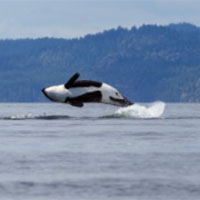Fifty-three marine shipping industry organizations have committed to participate in a first-of-its-kind voluntary study focusing on the relationship between slower vessel speeds, underwater noise levels and effects on killer whales.

Between August 7 and October 6, 2017, the speed of participating vessels will be reduced through the water in the Haro Strait.
Located between Vancouver Island’s Saanich Peninsula and San Juan Island, the passage is an important summer feeding area for the endangered southern resident killer whale population.
Approximately 900 deep sea vessels will transit Haro Strait during the study period, slowing down when it is feasible and safe to do so.
During the research trial, vessels will be asked to navigate over underwater listening stations, also known as hydrophones, at a speed of 11 knots, which is slower than typical deep-sea vessel operating speeds.
The hydrophones will monitor ambient and vessel underwater noise, as well as the presence of whales, and automated vessel tracking will be used to monitor vessel speed.
With all of the members of shipping associations Chamber of Shipping, Cruise Line International Association Northwest and Canada and Shipping Federation of Canada confirming their intent to participate, the 54 confirmed marine industry participants represent a very significant proportion of large commercial vessel movements through Haro Strait.

Robin Silvester, President and Chief Executive Officer of the Vancouver Fraser Port Authority, said: “Industry’s commitment to this voluntary research trial is a clear demonstration of the collective focus we have on ensuring a healthy marine environment, and we greatly appreciate our partners’ support.
“We know that impacts to vessel schedules can be costly to the shipping industry, but we also know the more vessels that participate in the trial, the more robust the scientific analysis will be, and the greater the opportunity for trial data to support evidence-based decision making about future vessel noise management measures.”
Existing scientific evidence indicates that underwater noise from vessels can interfere with killer whale echolocation clicks, calls and whistles, inhibiting the ability to hunt, navigate and communicate.
Existing research also suggests that vessels operating at lower speeds typically generate less underwater noise.
The study is a collaboration, planned and coordinated through the Vancouver Fraser Port Authority-led Enhancing Cetacean Habitat and Observation (ECHO) Program, in addition to a committee that includes representatives from B.C. Coast Pilots, BC Ferries, the Chamber of Shipping of British Columbia, Cruise Line International Association North West and Canada, Hapag-Lloyd, Holland America, the Shipping Federation of Canada, the Pacific Pilotage Authority, Vancouver Fraser Port Authority, Washington State Ferries and Transport Canada.

Published four times a year, Port Technology is the only technical preview and review of advanced technologies for ports, harbours and terminals world-wide. Each edition features over 30 technical papers written by leading industry professionals, which reflect emerging trends and technical advances that enhance efficiency and increase productivity in ports and terminals.
**If you are reading theOrcasonian for free, thank your fellow islanders. If you would like to support theOrcasonian CLICK HERE to set your modestly-priced, voluntary subscription. Otherwise, no worries; we’re happy to share with you.**








